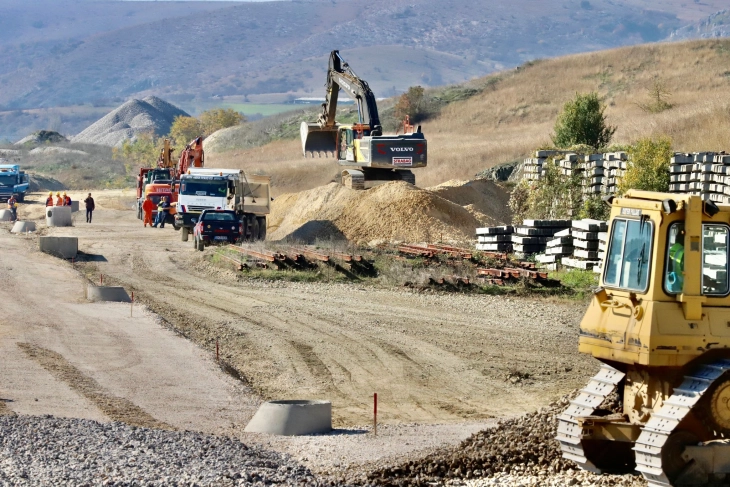EC: North Macedonia's GDP growth projected to accelerate moderately, driven by private consumption and investment
- North Macedonia's GDP growth in the coming period is projected to accelerate moderately, driven by private consumption and investment, according to the European Commission's Autumn 2024 Economic Forecast report released on Friday.

Brussels, 15 November 2024 (MIA) – North Macedonia's GDP growth in the coming period is projected to accelerate moderately, driven by private consumption and investment, according to the European Commission's Autumn 2024 Economic Forecast report released on Friday.
The report notes that in the first half of the year, the country's annual GDP growth was limited by low external demand, while headline inflation continued to slow down, with core inflation also showing signs of abating.
The EC forecasts the Macedonian GDP growth at 2% in 2024, 2.6% in 2025 and 2.9% in 2026.
Worsened merchandise balance and declined remittances, along with spending overruns, are likely to result in a much higher 2024 fiscal deficit than earlier projected, the EC estimates.
However, it notes, fiscal consolidation is likely protracted, with the deficit expected to decline to 3% only by 2027, and financing needs particularly high in 2025 and 2026.
"Domestic demand remained weak in the first half of 2024, with household consumption growth slowing down from 2023 levels, while the positive contribution from investment largely reflected base effects," reads the report.
It adds that output increased by 1.8% y-o-y on average in the first half of the year, largely on account of a steep drop in imports, overcompensating for the simultaneous decline in exports. According to the EC, the projected contribution to economic growth from the construction of the Trans-European Corridors 8 and 10d, is likely to materialise only in 2025 and 2026.
"Private investment is expected to strengthen. Household consumption is likely to pick up again, mainly due to fast rising wages and pensions, and the decline in inflation," the EC notes.
Net exports are not expected to contribute significantly to growth over the forecast period, against the background of a muted economic recovery in major export markets, in particular Germany, and increasing imports to feed the projected rise in investment. The overall moderate acceleration in GDP growth would also be affected by the projected increase in the services surplus, stemming from tourism and IT services.
The report further notes that annual consumer price inflation in the country continued to decline from its peak of 19.8% in October 2022 to an average of 3.3% in the first nine months of 2024.
"Inflation is projected to return to close to 2% on average in 2025," adds the document.
As regards the key policy rate, the report notes that after it was kept unchanged at 6.3 percent since September 2023, the National Bank cut the rate by 0.25bps each in September and in October 2024.
According to the EC, employment dropped slightly in 2023 and in the first half of 2024, while the outflow of labour became more pronounced, especially for young workers, with employers faced with a shortage of labour and with the need to pay higher wages.
"Average gross nominal wages rose by 14.8% y-o-y in the first eight months of 2024," notes the EC, adding that due to structural problems, employment growth is unlikely to pick up notably.
The forecast report expects budget balance to improve, as public revenue rose markedly in the first half of the year, partly reflecting the tax basebroadening legal changes which had entered into force in October 2023 and in January 2024.
In the revised budget, the new government raised the planned fiscal deficit from 3.4% to 4.9% of GDP to accommodate earlier unbudgeted spending commitments, mainly on public wages, a new ad-hoc increase in pensions implemented in September 2024, and lower than expected GDP growth.
"With a much higher than previously projected 2024 deficit, fiscal consolidation plans have been delayed, and the deficit is projected to drop to 3% only by 2027. Financing needs are elevated over the forecast period, in particular given refinancing for the repayment of two large Eurobonds in 2025 and 2026," reads the report.
The EC forecasts that risks to the country's economy are "mainly on the downside", though the strengthening of domestic demand could decline if household disposable income is hit by a slower recovery of remittances or by pressures on inflation and on employment due to high wage growth.
The document points out that the contribution of investment to growth may be protracted in case of further delays in the Road Corridor 8/10d project or of slowing progress in the management of public investment.
"On the other hand, faster integration with the EU, underpinned by structural reforms, as foreseen by the EU’s Growth Plan, could boost exports and productivity," concludes the EC's Autumn 2024 Economic Forecast report on the country.
Photo: MIA archive







